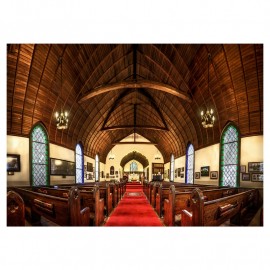Truth be Told: Life in a Religious Cult

I was 15 years old.
I was led to believe I was a better human than everyone else, especially those who didn’t believe the same as I did. I knew everything about life. I knew what it had to offer. I knew my duty as a woman, and I knew my future.
I also knew that if I didn’t live up to certain expectations I would never see my family again. I would have no one. I lived in fear because of my religion.
Some say that most people who are in a cult don’t know that they are. This was very true for me. I remember a woman from our church telling me, “KaraLee, if you don’t learn how to sew soon you can’t repair your husband’s clothes and you won’t be fulfilling your Godly duty as a wife! It’s not fair to him!”
I was 15 and already being pressured to find a husband. I grew up in a religious group that referred to itself as “a group of Christians meeting together under the name of the Lord.”
We met in a meeting hall, a nondescript building that was not called a church.
I believed that becoming a wife and a mother was all that was expected of me. I was reminded of the quote in the book of Ephesians, that said: “wives, submit yourselves unto your own husbands.”
This was my religious guideline. That was all that I knew.
There were no other options.
But I wasn’t the only one. Jolinda Collins had been a part of the group before I joined. “It wasn’t until about 1995 that things got so out of hand.” Jolinda said. “I couldn’t understand some of the modesty teachings for women. Slits in skirts, no haircut, no make-up of any sort. Look dowdy for Christ, really?”
At the age of 11 my family moved to Oklahoma from Texas. We joined another religious group that practiced the same beliefs. Here, the control only tightened. Words of affirmation spit from the mouth of the man behind the pulpit.
“Life outside what we know is not worth living!” he said.
Here, I became a target for bullies. I was 11. A group of girls were out playing on seesaws, trying to balance them out by sitting on each end. I walked over, wanting to join the group. Nittie, a girl I thought to be a friend, looked me up and down. She then told the group of four girls that they all needed to be on one side if I was going to be on the other.
After that, the teasing became more frequent.
Another girl commented on how much I ate. To emphasize her point, she poked my stomach. After that it became a game amongst my peers. Anytime they teased me, they would poke my stomach. Just a little reminder that I wasn’t good enough.
I realized that bullying isn’t uncommon. However, our religion taught us to love as God has loved us, and that’s God’s love is unconditional. Why then would a group of people whose belief was the foundation of this love make me feel so unloved?
I wasn’t the only young girl that felt like she had to fight a battle of acceptance completely by herself.
Eleven-year-old Natalie King, hiding in her bathroom, wrote in her journal: “I wish people would notice me more. I feel totally ignored. I’m not one of the popular girls in school. I’m the girl who has really long hair and wears skirts. Well, people don’t say that, but I imagine they do behind my back.”
Ashley Scott, who asked that I change her name for this story, had a similar experience.
“I remember grabbing the handles of the door and taking a deep breath before I stepped into the building and just completely becoming a different person. One that I knew would be accepted,” she said.
I felt that a woman with confidence was something to be ashamed of. Women were expected to be submissive and quiet. We were suppressed and discarded because all a woman was good for was to be a companion for man.
Peyton Carroll, another member of the cult, said she remembers feeling ashamed of her mother when she was 13 years old.
“I always knew that mom was not approved of and so I tried to follow the rules exactly,” she said. “But I always felt like no matter how closely I followed the rules, I would never be approved of. Also, I would never get as good of a husband whose mom or parents were approved of.”
Little did I know, but in Oklahoma there were other people experiencing the same things. Elohim City is a 400-acre spread of land dominated by a group of people who share the same belief, in far eastern Oklahoma, near the Arkansas border.
The people of Elohim City follow Judah’s teaching. They lock themselves away from the outside world, believing their undeveloped surroundings allow them to be one with the Holy Spirit.
It wasn’t until I was 20 when I met Jael Ridley. She moved to Oklahoma from California where she was once a part of an Independent Fundamental Baptist group.
We compared stories about our religious experiences. We both realized that the group she had been a part of also held some cultish aspects.

“Say you had to miss Wednesday night service for work.” Jael said. “You would get fined up to $20 for missing church.”
According Janja Lalich, a sociology professor at California State University, many members, former members, and supporters of cults are not fully aware of the extent to which members may be manipulated, exploited, or even abused.
Jael said she, too, felt trapped.
“I most certainly felt trapped and definitely sought help,” she said. “I would reach out to people I knew who were raised the same way and had left and ask how they did it.”
Jael told me she “wanted to leave, but I knew if I did, I’d be seriously questioned, and let my parents down.”
Although most people tend to associate the term “cult” with strict religious groups, in an article by Lalich, she quotes Margaret Singer, a clinical psychologist, who estimated that “approximately 10 to 20 million people have at some point in recent years been in one or more cult groups.”
The problem with being able to recognize if someone is a part of a cult or not and if that group poses any danger, is that most people don’t even realize that they are in one.
The issue gets even more complicated for those that do realize their circumstances, they have a hard time getting out.
Not only do people like myself and these women face the disconnection of family, but we had to adjust to a completely new way of life.
In my case, this religious group was all I had known. All my friends and family were a part of it and I didn’t know how to start over. I was told so many times I couldn’t do something because I was a weak woman. I started to believe it.
The man at the pulpit might as well have been God himself.
“One of the leaders completely suppressed and quenched the Holy Spirit.” Jolinda recollects. “We discredited the Holy Spirit which makes us have to become it. Thus, making rules and critiquing everyone.”
Rule after rule was layered upon us, suffocating what little courage we had. No woman could show their shoulders. We couldn’t wear boots with skirts because that caused a feeling of temptation for one man so it was logical to make it a rule for all women.
“Rules which they called recommendations, but since we were to obey those who have the rule over us, that made them rules.” Jolinda said. “Those that didn’t follow recommendations were looked at as weak Christians.”
We were taught that we were walking in the truth, we had the complete truth and no one else could possibly know any better or any more than we did. God’s word was taken out of context and twisted to fit whatever image the leaders desired.
Today, there are support groups like “The Cult Research and Information Center” that are dedicated to helping cult survivors rebuild their life. The center allows both current and former members of cults professional consultations for anyone who needs help.
While there are not many foundations who are solely dedicated to helping cult members readjust, there are people like Vennie Kocsis who is a former cult survivor, and offers support to many other survivors throughout the nation.
It is said that pride comes before the fall. What once had the potential to be a good thing, catastrophically erupted into rebellion when others like myself began to ask questions.
Yet the group still stands.
Every day its members are manipulated, sinking deeper and deeper in this religious appearance of what it means to be the right Christian. This type of manipulation occurs on such a high level that it is often hard to recognize, much less dig yourself out. Even now, it often seems hopeless.
Six girls fought a strenuous battle to get where they are today. Thankfully, none were physically abused, although we knew of others who were.
We were however, all mentally abused and programed not to ask questions, especially when it came to religious beliefs.
My self-esteem was broken. Women were too fragile to work outside the home. We weren’t smart enough to go to college. Skirts had to be worn two inches below the knee because all women were, was a temptation for man.
“Even though it was such a short period of our lives, the thing is that it is going to affect us forever.” Natalie said. “I don’t think we are ever going to truly get over it.”
